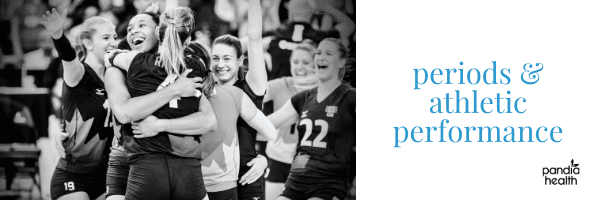Medically reviewed by Sophia Yen, MD, MPH – Written by Pandia Health Editorial Team
During the Winter Olympics, we had a blast watching our country’s best athletes win medals and make major headlines in Pyeongchang. We’re so proud!
In thinking about these stellar athletes and their performances, we thought about how athletes have to practice and endure with blood, sweat, tears and more, to get to where they are today.
How do Olympic athletes do it?
It takes everything to compete at the Olympics, and for us women it can also affect parts of our bodies in ways people don’t really talk about.
Today, we’d like to address a reproductive health topic that could improve athletes’ performance:
Do periods affect a female athlete’s performance?
Olympic figure skater Mirai Nagasu had to contend with her periods as she competed in the 2018 Pyeongchang Olympics. On her way to the Olympic Games, Nagasu told Cosmopolitan that she had her period on her way to the games.
While getting her period and dealing with cramps may add stress to an already stressful situation, female athletes like Nagasu have learned to stay focused. “It’s really not that big of a deal. You just stick a tampon up there,” says Nagasu. She also finds that skating is a therapeutic exercise to alleviate cramps.
It was also a major topic in the 2016 Rio Olympics when Aunt Flo decided to visit Chinese swimmer Fu Yuanhui the night before her 4×100 meter relay.
After her race, a reporter asked why she was holding onto her stomach.
“I feel I didn’t swim well today – I let my teammates down. My period came last night and I’m really tired now. But this isn’t an excuse, I still didn’t swim as well as I should have.”
What Research Says
Northwestern Medicine Assistant Professor Lynn Rogers is trying to see if athletic performance is impacted by menstruation. Rogers, along with Dr. Ellen Casey, with the University of Pennsylvania, and research professor Yasin Dhaher, have teamed up to understand how hormonal fluctuations throughout the menstrual cycle affect how the brain and its nerves controls muscles and joints.
Understanding this connection not only helps athletes understand what they need to do to perform at their peak level but also how to prevent injuries.
Studies have shown that at certain times in their cycle, women are more prone to injuries.
According to Rogers, ACL injuries seem to occur more often in the first half of a woman’s cycle when women are 9 times more likely to get ACL tears.
However, when it comes to periods and athletic performance, the verdict is still out.
Mayo Clinic gynecologist Dr. Petra Casey agrees there isn’t really a consensus. “There are just as many studies that say performance does not vary throughout the menstrual cycle as there are studies that say it does… However, there are just as many women athletes who set personal records during their luteal phase, during their menstrual cycle, during their follicular phase, whatever.”
All in all, it really just depends on the woman.
Female Athletes, Undernutrition, Irregular or Missed Periods, and Low Bone Density: The Female Athlete Triad
The combination of various signs and symptoms that leads to undernutrition, irregular or no periods, and low bone density is a syndrome known as the Female Athlete Triad.
Undernutrition, irregular or no periods happen with in athletes who are too lean (not enough reserve energy on their body) or those who do excessive, prolonged, intense exercise, i.e. the athlete does not keep up adequate energy intake (eating enough calories) for the amount of energy expenditure (exercise) she is doing through her sport. This is because the body is telling her that the body doesn’t have enough calories to support making a baby. All the energy is going towards the sport.
While periods may or may not affect a woman’s athletic performance, the reverse occasionally occurs, meaning that a ton of exercise may sometimes cause irregular periods or periods to stop altogether.
Also, low bone density and thus risk of fractures comes with this undernutrition state.
The treatment is to see a nutritionist and/or adolescent medicine specialist or medical provider who is familiar with the Female Athlete Triad. They will most likely advise increasing caloric intake and/or decreasing physical activity. You can do as much exercise as you want, as long as you take in enough calories to maintain your period.
However, if you are on hormonal birth control, this may mask the insufficient calorie intake by producing “artificial periods.” Since birth control pills are hormonal, they work to lower and balance the amount of estrogen and testosterone in the body. The hormone balancing often results lowering the amount of testosterone in the body which can lead to mineral deficiencies such as in B12 and magnesium. These minerals are essential in the recovery and muscle rebuilding while higher levels of testosterone are responsible for building strength and muscle mass more quickly.
So, if you are an elite athlete and not getting your peak performance, make sure you consult a nutritionist and/or medical provider familiar with athletes and undernutrition.
Will Female Athletes Get Their Periods Back?
The good news is that if you are a female athlete who has been missing periods due to being too lean or working out too intensely, you can easily get your periods back.
By simply increasing your body weight or reducing the intensity of your workouts, your body will return to its state where it can support a baby, and your period should gradually begin to make its way back to say hello.
Once your period is back and is regular, your ability to have a baby will also be back, like your periods never went away in the first place.
Note: just because you don’t have a period, don’t assume you can’t get pregnant. If you are having vaginal intercourse and don’t want to get pregnant, make sure you use birth control.
Another Option: “Turn Off”/Skip Periods
Runner Kiran Gandhi started her period the night before she ran her first marathon, the 2015 London Marathon.
Gandhi chose to run without tampons or pads and finished her race with blood running down her legs. She felt that running with feminine products wasn’t for her because “it seemed like it would chafe me, it seemed uncomfortable, and I didn’t want to have to stop running to deal with something.”
But many women don’t realize that turning off their periods is even an option.
By turning off their periods with hormones, women can improve their athletic performance by:
- Preventing premenstrual and menstrual symptoms
- Reducing the risk for injuries.
- Reducing discomfort from cramps and feminine hygiene products
- Decreasing anemia or iron deficiency which would result in more oxygen going to the muscles and brain
How Can Female Athletes “Turn Off” Their Periods?
Turning off periods is super easy through the birth control pill or ring.
For those on the 4 week pack of birth control pills, women simply skip the last week of their pill pack and go directly into their new pack.
Women using the birth control ring can simply change out their ring on the same day each month or every 4 weeks. The ring actually has 35 days worth of hormones so by changing it out on the same day each month, women will skip their periods.
There may be some breakthrough bleeding with the ring when trying to get to no periods at day 28 or so. If that happens, just take out the ring, have “a period” and then put back a new ring after 5 days of bleeding
For the next time change the ring on the day before the breakthrough bleeding happened. For example, if the breakthrough bleeding happened on day 30, then change the ring on day 29.
Is It Safe To “Turn Off”/Skip Periods?
Yes, “turning periods off” is safe. Some women may feel that it’s unnatural to skip periods, but women now have 300-500 periods in their lives versus 100 in the “old days.”
Unfortunately, Dr. John Rock, one of the developers of the birth control, put in a week of placebo pills so that women would bleed.
Now why would he do that when his 2 co-founders said it was unnecessary for women to bleed monthly?
Simple – to receive support from the Catholic Church.
Dr. Rock proposed that the birth control pill was simply to make periods regular and thus could be used with the rhythm method. By having 100% predictable periods on the pill, couples could use the rhythm method perfectly. Although, Dr. Rock won the argument with his pill co-founders to make women take placebo pills 1 week out of 4 and bleed unnecessarily, he lost the argument with the Catholic Church and was unable to get their endorsement of his co-invention.
Had Dr. Rock’s other co-founders won the argument, women would’ve been skipping periods on the birth control pill much earlier.
Most female physicians skip their periods using hormonal methods. Physicians also prescribe birth control to turn off periods in women to help improve: seizures, diabetes, anemia, heavy periods, severe menstrual cramping, acne.
Learn More About How to Skip Periods
To learn more about how to safely skip periods, watch our video, or read our previous blog, or listen to this podcast.
And whether you’re an athlete or just someone who wants to skip periods, we make it easy for any woman to get prescription birth control. Find out how you can get birth control delivered right to your door. Free*.
We also have a team of expert doctors who can provide a confidential online doctor visit if you need a new or renewal of a prescription.
Plus, Pandia Health will provide automatic refills, so you can focus on your athletic performance or simply staying fit and healthy.
*No co-pay and no deductible under the ACA (Affordable Care Act) as long as you have insurance. We accept most forms of insurance except for Kaiser and TriCare.
Disclaimer: The views expressed in this article intend to inform and induce conversation. They are the views of the author and do not necessarily represent the views of Pandia Health, and are for informational purposes only, even if and to the extent that this article features the advice of physicians and medical practitioners. This article is not, nor is it intended to be, a substitute for professional medical advice, diagnosis or treatment, and should never be relied upon for specific medical advice.



